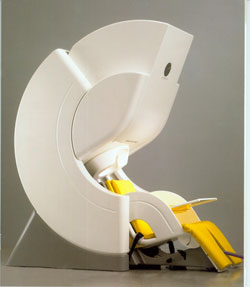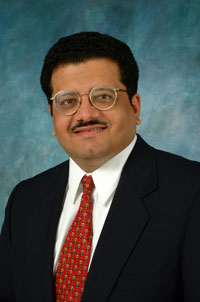 |
The magnetoencephalograph, also known as MEG, is coming to the medical center later this year. UNMC will be one of the only sites in the country to have the MEG, which is the world’s most advanced test of brain function. |
The machine, known as the magnetoencephalograph (MEG), is the most advanced test of brain function in the world. Its impact on UNMC will likely be felt in clinical and research settings in the fields of neurology, neurosurgery and psychiatry, said Sanjay Singh, M.D., director of The Nebraska Epilepsy Center at UNMC and its hospital partner, The Nebraska Medical Center.
UNMC will be one of about 10 sites around the country to have a MEG, Dr. Singh said.
“This is the best thing that has happened to neurosciences in a long time,” Dr. Singh said. “The clinical uses of the MEG are many and the research possibilities are endless.”
Funding for the MEG, which costs about $2.5 million, is coming from The Nebraska Medical Center and from an anonymous donor who gave $1 million to secure the machine, Dr. Singh said.
“We’re really fortunate that this person was so generous,” Dr. Singh said. “That the person wished to remain anonymous made the contribution even more amazing.”
 |
Sanjay Singh, M.D. |
“If you move your finger,” Dr. Singh said. “The MEG will let us see what part of the brain told your finger to move.”
This kind of vision into brain function can help neurosurgeons be more precise when operating, let epilepsy experts see better where the brain is malfunctioning and allow psychiatrists to get a better understanding of how brains function in those with mental disorders, Dr. Singh said.
MEG is potentially the most helpful tool for treating neuropsychiatric illness to come on the scene in a long time, said James Sorrell, M.D., associate professor in the department of psychiatry.
“We will utilize it to explore and gain a better understanding of depression, schizophrenia and the confusional states associated with various medical conditions,” Dr. Sorrell said. “This gift will provide the impetus for exciting developments that ultimately will help our patients get better.”
Patients with Alzheimer’s, Parkinson’s and dementia also stand to significantly benefit from the MEG.
“From a neurological treatment standpoint alone, the implications of having a MEG here at the medical center are immense,” said Pierre Fayad, M.D., Reynolds Centennial Professor and chairman, UNMC Department of Neurological Sciences. “But this technology will increase the medical center’s profile and status on many levels.”
The MEG will give UNMC researchers a distinct advantage when they apply for grants, Dr. Singh said.
“The machine is very expensive and funding sources are not going to give researchers grants to buy one,” Dr. Singh said. “But when our faculty apply and say they already have a MEG, that makes their grant applications so much more attractive than those from researchers who need equipment funding.”